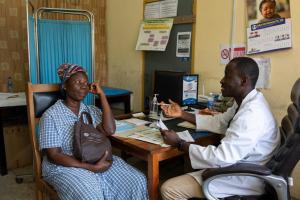WHO supports scientifically-proven traditional medicine
WHO has said that it welcomes every opportunity to collaborate with countries and researchers to develop new therapies and encourages such collaboration for the development of effective and safe therapies for Africa and the world.

Brazzaville – The World Health Organization (WHO) on Tuesday, May 4, annonced that it welcomes innovations around the world including repurposing drugs, traditional medicines and developing new therapies in the search for potential treatments for COVID-19.
WHO recognizes that traditional, complementary, and alternative medicine has many benefits and Africa has a long history of traditional medicine and practitioners that play an important role in providing care to populations. Medicinal plants such as Artemisia annua are being considered as possible treatments for COVID-19 and should be tested for efficacy and adverse side effects. Africans deserve to use medicines tested to the same standards as people in the rest of the world. Even if therapies are derived from traditional practice and natural, establishing their efficacy and safety through rigorous clinical trials is critical.
African governments through their Ministers of Health adopted a resolution urging Member States to produce evidence on the safety, efficacy and quality of traditional medicine at the Fiftieth Session of the WHO Regional Committee for Africa in 2000. Countries also agreed to undertake relevant research and require national medicines regulatory agencies to approve medicines in line with international standards, which include the product following a strict research protocol and undergoing tests and clinical trials. These studies normally involve hundreds of people under the monitoring of the national regulatory authorities and may take quite a few months in an expedited process.
WHO is working with research institutions to select traditional medicine products which can be investigated for clinical efficacy and safety for COVID-19 treatment. In addition, the Organization will continue to support countries as they explore the role of traditional health practitioners in prevention, control, and early detection of the virus as well as case referral to health facilities.
Over the past two decades, WHO has been working with countries to ensure safe and effective traditional medicine development in Africa by providing financial resources and technical support. WHO has supported clinical trials, leading 14 countries to issue marketing authorization for 89 traditional medicine products which have met international and national requirements for registration. Of these, 43 have been included in national essential medicines lists. These products are now part of the arsenal to treat patients with a wide range of diseases including malaria, opportunistic infections related to HIV, diabetes, sickle cell disease and hypertension. Almost all countries in the WHO African region have national traditional medicine policies, following support from WHO.
As efforts are under way to find treatment for COVID-19, the WHO warns that caution must be taken against misinformation, especially on social media, about the effectiveness of certain remedies. Many plants and substances are being proposed without the minimum requirements and evidence of quality, safety and efficacy. The use of products to treat COVID-19, which have not been robustly investigated can put people in danger, giving a false sense of security and distracting them from hand washing and physical distancing which are cardinal in COVID-19 prevention, and may also increase self-medication and the risk to patient safety.
WHO has said that it welcomes every opportunity to collaborate with countries and researchers to develop new therapies and encourages such collaboration for the development of effective and safe therapies for Africa and the world.